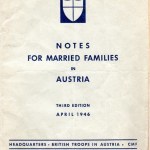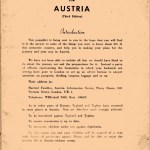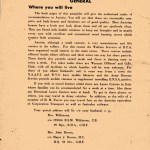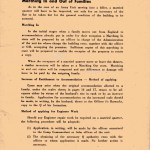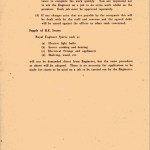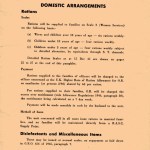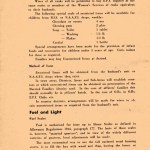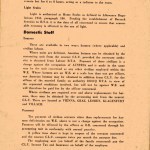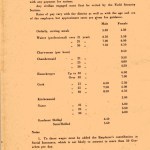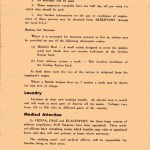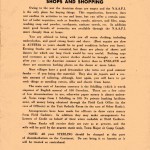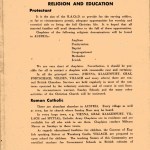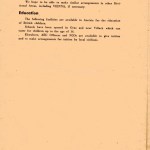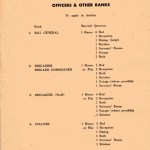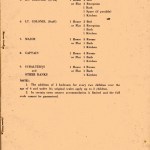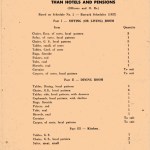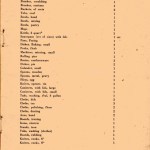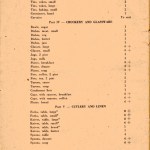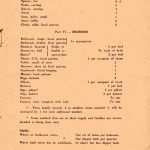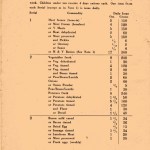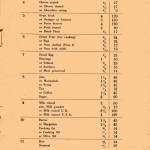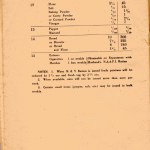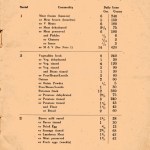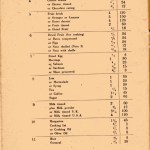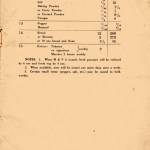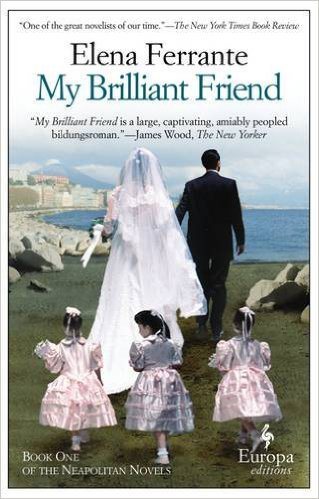Julian Gray's Blog
June 10, 2019
New novel by Julian Gray: The Sins of My Fathers
If you liked the characters in Interrogating Ellie, my new novel, The Sins of My Fathers, tells the story of Louis Nicholson, Ellie’s lover in Klagenfurt. Who was he really? And who was Ruth, the ‘wife’ in London he returned to after Austria?
You can get it on Amazon, in Kindle or paperback:
and here’s a link to the first review (on Goodreads). If you read the book, don’t forget to say what you think by reviewing on Amazon and/or Goodreads
Link to Goodreads reviews of The Sins of My Fathers, by Julian Gray
The post New novel by Julian Gray: The Sins of My Fathers appeared first on Interrogating Ellie.
March 28, 2017
Notes for married families in Austria, 1946
This was given to wives joining British servicemen in Austria in the immediate aftermath of World War Two. It is a fascinating reflection of the times. The allocation of housing was strictly graded according to military rank. Note the throwaway comment on page 13: "Owing to the war the Austrian shops are empty" and the difference in pay for men and women doing the same job (page 10). My thanks to Susie Ambridge for providing this. It was given to her mother in 1946 and she has kept it ever since. You can read her story here.
The post Notes for married families in Austria, 1946 appeared first on Interrogating Ellie.
March 21, 2017
These Foolish Things.
Susie Ambridge (not her real name) read Interrogating Ellie and sent me these poignant memories of post war Klagenfurt and Vienna. In 1946, aged just three years old, she, her brother and mother travelled to join her father in Klagenfurt, and then spent several years in Austria. Her mother found her reunion with her husband far from straightforward.
These Foolish Things
In the summer of 1946, a train chugged its way across the lowlands of Belgium and France, destined for Klagenfurt in Austria. My mother and I were among those British wives and children about to be reunited with husbands and fathers after five long years of war.
If I had looked out of the window, I would have seen convoys of Army trucks or groups of refugees. The people of Europe were struggling to survive. A report from UNICEF estimated there were twenty million needy children in Europe who were homeless and starving.
But I was lying on my back, crying pitifully and kicking my legs in the air. We were playing ‘Mummies and Daddies’ and being the youngest at three and a half years, I was always, but always, the baby.
‘Cry!’ said the big boy who was the father. ‘You’ve got to cry, ‘cos your nappy’s wet. Wet your nappy,’ he commanded. A towel had been draped around and between my legs.
My mother’s voice floated down from the top bunk where she had taken refuge.
‘Just make-believe: pretend you’ve wet your nappy.’
The train progressed at a tortoise pace, stopping frequently for inspections and border checks. We heard boots clumping along the corridor and soldiers in khaki uniforms, with guns slung over their shoulders, crowded into our small compartment:
‘Passports please!’ ‘Passeportes, s’il vous plait!’
As our destination approached, excitement rose. The war was over, the sun was warm, summer dresses were unpacked and cold, rainy London with its streets of rubble lay far behind. Wives titivated themselves in readiness, hair shampooed in small basins was rinsed with a tooth-mug; eyebrows were plucked, lips painted and cheeks rouged. The time came at last to leave the dim interior of the train and stand on the unbelievably sunlit platform.
A tall man, with crisply pressed army shirt and shorts, scooped me into his arms. He was smiling and his brown eyes crinkled at the corners. He held me very tightly. The waves in his dark hair were so deep I wanted to put my fingers into the hollows.
‘Are you my daddy?’ I asked.
A babble of sound rose, everyone hugging and kissing. A great wave of happiness swept up and down the platform. Everything would be fine now.
Well, no, it wasn’t. War creates problems – men are killed or injured, bombs fall and houses are destroyed – but relationships can suffer too. I knew nothing of this as a child, but remember the raised voices and hiding under the bedclothes, while the walls trembled with the passion and unhappiness seeping into my bedroom.
*
It’s a sunny day in June and I have just finished my last ‘A’ Level exam. We are all delirious with relief; I promise to let my friends know my new address.
‘You’d better write,’ they say. ‘When can we come and visit?’
My father is working out in Nassau, in the Bahamas and we are to join him now my exams are finished. The possibilities for my future are infinite. I have already mapped out several versions. Outside the school I am surprised to see my mother waiting for me. I’m nineteen – she doesn’t normally collect me from school.
‘This is a nice surprise,’ I say. She’s wearing sunglasses. I can’t ever remember seeing her in sunglasses before.
‘I thought we’d take the bus home for a change,’ she says. I usually catch the train.
We sit in the front seat on the top deck of the bus. There’s no-one else up there. It’s a hot day but with the windows open, the bus is airy. We wind our way through the leafy lanes of Buckinghamshire, tree branches brush and snap against the window. It takes longer than the train, probably about an hour.
My mother keeps her sunglasses on even though we are shaded from the sun. She asks about the exam and we chat for a bit. Then, looking straight ahead, although I can’t see her eyes behind the dark glasses, she says, her voice trembling:
‘I didn’t want to tell you before, not until your exams were over. Your father isn’t coming back.’ Her voice breaks and she takes off the sunglasses to dab at her eyes which I notice are red. ‘I’ve pleaded with him not to do this to you, to me, but it’s no good. He’s met someone else. I should have known.’ She blows her nose and swallows hard. ‘I thought he gave me a strange look when he was getting on the plane. He wrote to tell me just before Christmas – typical, he didn’t have the nerve to tell me face to face.’
She’s known all this time. I wish she’d told me before, but now she has started, she can’t stop. She has kept the hurt to herself for so long; now that she’s let go the words tumble out. This is not the first time my father has been unfaithful. It happened before, in Austria, years ago.
‘I didn’t want this to happen to you,’ she says. ‘My life was turned upside down at your age but I wanted everything to be right for you.’
Her mother had died when she was eighteen, the same year her father became bankrupt in the 1930s financial melt-down. She had to stay at home to look after her younger sisters.
I feel numb, frozen inside. I can’t say anything, just listen to my mother as her story unfolds, my dreams of what might have been dissipating to never-never land.
*
I don’t remember much about our first months in Austria. I learnt to float in the lake near Klagenfurt; Auntie Lily taught me – everyone was an auntie then. The house we lived in left an impression of age and painted walls.
Expat communities are small and tight-knit; gossip soon gets around. Other wives were only too pleased to tell my mother that her husband had been seen with another woman, they thought she was an Austrian or maybe a refugee. My mother didn’t want to believe it at first, their reunion had been so happy. She tackled my father – these were the raised voices that had made me hide under the bedclothes. He had confessed. It was true, but he had not meant to get involved. He’d felt sorry for the girl at first; the Austrians were starving. He’d tried to help, she had been so grateful and one thing had led to another. He promised my mother it was all over, he would not see her again. Now we were all together, everything was going to be fine.
That winter, the winter of 1946-47, Western Europe was gripped by the worst weather in decades. Snow was falling heavily the day we moved from Klagenfurt in Kärnten to Vienna, travelling in an army lorry over the Semmering Pass, a journey of nearly one hundred and fifty miles. With the snow piled high at the side of the road and daylight fading, it was difficult to see the road ahead. Sandwiched between my parents and wrapped in an eiderdown, I sat high up in the cab while next to us the driver peered through the window, trying to find his way through the blizzard which battered against the truck. From time to time he would veer off the road into a snowdrift and we would all have to get out. My mother and I stood with the icy flurries blasting up our trouser legs while my father and the driver dug and pushed to get us going again.
At first we lived in a small flat in Stadlergasse in the district of Hietzing, part of the British sector. Shortly after we moved to Vienna, there was a day when my mother and I took a tram into the centre of town, to walk along Mariahilfer Strasse, the main shopping street, although at that time there was very little to buy. A dark winter’s day was made more depressing by the bomb-flattened buildings we passed.
Lights from the shop windows cast glistening shadows on the heaps of snow at the side of the road when my mother whisked me on a sudden whim into a café. The windows were opaque with condensation and the gentle notes of a Chopin nocturne drifted from the pianist in the corner. I was treated to a warm drink and a chocolate Florentine while my mother sipped her black coffee. She was distracted, not listening to my chatter.
Years later, during the bus ride through Buckinghamshire, I learn that she had seen my father and his girlfriend, arm-in-arm, on the opposite side of the street.
‘After all his promises …,’ she says and I can see that even after all these years, the hurt is still as raw. ‘I didn’t know what to do. But I was so angry. I couldn’t put up with it any more; I made up my mind in the café. I would go back to the flat and pack; you and I would go home to England.’
‘But you didn’t,’ I say. ‘What happened?’
‘That was my mistake, a big mistake,’ she says, crumpling up her soggy handkerchief. ‘I put you to bed first. Then I confronted him. Oh, he made lots of excuses, he hadn’t known she was coming, she’d followed him…. but I saw them together, arm-in-arm, laughing. He was upset though when I said I was going. He didn’t want to lose you.’ She takes hold of my hand and squeezes it. ‘Your father does love you, don’t forget that.’
‘Huh, you could have fooled me,’ I say.
‘I was determined not to stay but when your father saw me packing and realised I meant it, he started pleading with me not to leave. He asked Donald, his boss, to come and talk to me.’ She wipes her eyes again and shakes her head in despair. ‘I should have ignored them. But your father kept saying he still loved me; Donald told me it happened to lots of men and how it didn’t really mean anything. He said your father had a good career ahead of him and would need a good wife like me. If I went home, I’d be a woman on my own and that would be difficult.’
*
So, in the end, we remained in Vienna.
We moved again, to a bigger house, a villa in a tree-lined residential area. Houses for British officers and other public servants were allocated by rank. My father was attached to a division of the Foreign Office called Public Safety which among other things, was involved with the de-Nazification of Austria. Our house had been owned by a Herr Braun, who must have been a member of the Nazi Party. He had not been imprisoned, but his property was confiscated. He asked if he could come and look after the garden. He was a thin, sad-looking man and I believe my mother felt sorry for him and so, once a week, he would come to weed and prune his many fruit trees which filled the garden every spring with pink and white froth. There were apples and pears, fragrant, soft apricots and sweet, crimson cherries which you had to bite in half first, to make sure there were no wriggling maggots inside.
I am sure we also shared the fruit with him. In the early years after the war, starvation was a real threat for the Austrians. The bad winter, followed by a wet summer meant the harvest failed and British families were encouraged to employ as many Austrians as possible. Our first maid was Rosa. She was a warm motherly girl and I loved her, but she left us after a year to marry someone she had been corresponding with in Argentina. Our next maid, Gisella, was slapdash at housework but a wonderful cook who produced miracles with our weekly delivery of army rations.
My mother kept a booklet entitled ‘Notes for Married Families in Austria’ which had headings such as ‘Looking After Your House’, ‘Scales of Accommodation’, ‘Shops and Shopping’; the latter containing the gem: ‘Owing to the war the Austrian shops are empty’ which did not seem to give much scope for shopping.
You had to be a Brigadier before you were allocated a garage and a Colonel before you were entitled to a Servants’ Room. There were also detailed lists of furniture and equipment provided, from sofas to egg slicers as well as exact ration quantities allowed per person, down to one-eighteenth of an ounce of chutney per day.
I started school at an Austrian school, as my parents wanted me to learn German. My special friend was Liselotte whom we met half-way on the walk to school and her mother took us the rest of the way. My parents too made Austrian friends; there was Dr Hans Gruber and his wife, Ernst and Edith Smidt and Max and Hilda Erni. They had tried, like many Austrians, to keep out of politics during the war and were immensely relieved at Hitler’s demise.
The social whirl that was post-war Vienna soon encircled my parents. Austrians loved to celebrate; cocktail parties and balls flourished, becoming frenetic and masked during Fasching in the weeks before Lent.
‘Don’t forget to bring me something back,’ I would say, when my mother came to kiss me goodnight, rustling in her black silk dress with the iridescent peacocks, the auburn lights in her hair gleaming. In the morning there would be a paper hat or mask, a chocolate or bon-bon at my bedside.
You could not live in Vienna without learning to love the music of Mozart, Haydn and Beethoven. My father already played the piano well and I began lessons. I had a book of easy Strauss waltzes while my mother whirled around the dance floor in true Viennese fashion to the strains of The Blue Danube and Tales of the Vienna Woods. In nightclubs they listened to Anton Karas playing the Harry Lime theme from The Third Man on his zither. My father had guided the film production crew round the Vienna sewers; I could never fathom why he was an expert on sewers.
My father loved to entertain guests with his piano rendition of The Third Man or whatever song was popular at the time. His feet tapping the rhythm he would very quickly pick out the tune of the latest song by Doris Day or Guy Mitchell. The women, my mother included, would cluster round to join in the chorus. Whenever I hear the tempestuous chords of The Dream of Olwen or The Warsaw Concerto I can see my father, his hands flying over the keys.
Looking back, I recognize that the life they lived in Vienna helped keep them together. Once back in the Britain of the nineteen-fifties, with money tight and jobs hard to find, things began to unravel.
*
As my mother’s story unfolds, on the top deck of the green Buckinghamshire bus, I begin to understand the antagonism I had sensed between them.
She’s got herself under control now. The sunglasses are off. ‘I’ve been thinking,’ she says. ‘I can’t possibly stay here. I can’t bear people to know your father’s left me. How would you like to go and live in Scotland?’
Which is the reason a couple of months later I found myself travelling on a train, speeding northwards. In the early dawn as I watched the silver seas of Northumberland flash past, I thought of the last two lines of a song my parents often sang together:
‘…Oh, how the ghost of you clings
These foolish things remind me of you.’
Susie Ambridge
The post These Foolish Things. appeared first on Interrogating Ellie.
October 13, 2016
Interrogating Ellie review
I was so pleased to get this great Amazon (USA) review of Interrogating Ellie.
A unique look at the Nazi home front during the second world war – meticulously researched and beautifully written. This is a gripping book that will keep you at the edge of your seat from beginning to end. The turns and twists are so amazing that at one point I stopped to say to myself – it has to be a true story – no author could invent something as incredible as this. And, indeed, it is. Written by the son of the heroine and investigated meticulously by her daughter. Other than an amazing story of survival at war as a woman, with all the troubles that befell the heroine because she was a woman, this is an interesting look into the Nazi home front. I have read a lot of books about the Second World War and the Holocaust. There are very few that describe the war from the Nazi home front perspective. This book is unique because it is about a British national who spent the whole war in Nazi occupied Austria in constant fear for her life and under the radar. Because she was a foreigner, she was able to see Nazi society and answer questions like “Did they know the atrocities that were committed in their name?”, “Did they care?”. Other than the Nazis, the other “villains” are the Russians and the British, who, at the end of the war refused to let the heroine back into her country because of her so called “bad character”. In this sense, the book can be seen as her defense, researched and written by her children. Definitely recommended!
The post Interrogating Ellie review appeared first on Interrogating Ellie.
Interrogating Ellie on offer at 99p/99c
I was so pleased to get this great Amazon (USA) review of Interrogating Ellie, my novel which is on sale at 99c/99p for the next few days.
http://www.amazon.com/Interrogating-E...
http://www.amazon.co.uk/Interrogating...
A unique look at the Nazi home front during the second world war – meticulously researched and beautifully written. This is a gripping book that will keep you at the edge of your seat from beginning to end. The turns and twists are so amazing that at one point I stopped to say to myself – it has to be a true story – no author could invent something as incredible as this. And, indeed, it is. Written by the son of the heroine and investigated meticulously by her daughter. Other than an amazing story of survival at war as a woman, with all the troubles that befell the heroine because she was a woman, this is an interesting look into the Nazi home front. I have read a lot of books about the Second World War and the Holocaust. There are very few that describe the war from the Nazi home front perspective. This book is unique because it is about a British national who spent the whole war in Nazi occupied Austria in constant fear for her life and under the radar. Because she was a foreigner, she was able to see Nazi society and answer questions like “Did they know the atrocities that were committed in their name?”, “Did they care?”. Other than the Nazis, the other “villains” are the Russians and the British, who, at the end of the war refused to let the heroine back into her country because of her so called “bad character”. In this sense, the book can be seen as her defense, researched and written by her children. Definitely recommended!
The post Interrogating Ellie on offer at 99p/99c appeared first on Interrogating Ellie.
July 9, 2016
Nice review of Interrogating Ellie on Amazon
Nice review of Interrogating Ellie on Amazon, (which is currently on offer at 99p/99c on Amazon)
A book that you can read for a second time within a year and enjoy it all over again
ByAlois Haitzendorfon 8 July 2016
Format: Kindle Edition
Any book that you can read for a second time within a year and enjoy it all over again, classifies as an important book and as a good book.
Once you have finished the Ellie book you can see the REAL people behind the story at www.interrogating-ellie.com
I communicated with the author (via the above website), and congratulated him on the story, the book, and the accuracy of all the place names and addresses, with a few corrections which I conveyed to him. I wonder if he invented most of the dialogue like a novelist, or are all the dialogues based on his mom telling him her story on tape while she was still alive?
This book is highly recommended!!!
The post Nice review of Interrogating Ellie on Amazon appeared first on Interrogating Ellie.
April 7, 2016
When the Doves Disappeared, by Sofi Oksanen: a review
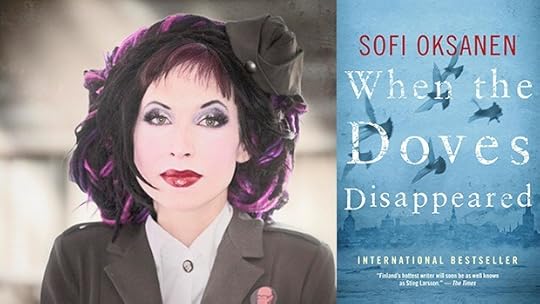
Sofi Oksanen and When the Doves Disappeared
This historical novel is set in Estonia, switching between the early Soviet occupation of the country in 1940 before the Germans arrived in 1941, and the subsequent return of the Soviets. Through this period there was an unsuccessful struggle for Estonian independence, supported to an extent by Finland, which had its own problems with the USSR.
Estonia is a tiny country, just above Latvia and Lithuania, across the sea from Finland. I knew nothing about it before I read this book and, if nothing else, the novel is a helpful history lesson. The story focuses on the relationship between Roland, an underground fighter for Estonian independence throughout these periods of occupation, his cousin Edgar, an unprincipled turncoat, whose loyalties switch with whoever is in power, and Juudit, the unhappy wife of Edgar, whose search for personal happiness leads her into politically compromising situations, including a love affair with an SS officer. Switches between the period of German occupation and the 1960s under the Soviets, enable the author to tell a story in which the past lives of the protagonists are constantly threatening to catch up with them.
Edgar’s involvement in spying on his fellow citizens, engineering their fates so that his own position is protected, and creating propaganda for both the Nazis and the Soviets in a craven search for advancement and survival, is conveyed very effectively. His cousin Roland’s story becomes submerged out as the story of Juudit emerges, although Roland’s continuing survival in the underground acts as a spur for Edgar’s schemes, since Roland knows far too much for Edgar to feel safe. Roland also acts as a guilty conscience for Juudit, driving her at times to take actions that undermine her own security in the fear-laden atmosphere that accompanies both the Nazi and the Soviet repression.
The novel does a very good job in conveying the paranoid world generated by two different police states, and the effect of this on family loyalties. The story both jumps between time periods and moves from character to character without, sometimes, explaining their changes of name and identity, requiring the reader to figure this out. This provides a somewhat fractured experience for the reader, which is perhaps to mimic the fractured consciousness of the characters, who are constantly negotiating forces pulling them one way or another. Edgar, in particular, ducks and weaves his way as if through an obstacle course, emerging in the end as a wholly psychotic character. The regimes he serves encourage this psychosis, providing the links between politics and personality that a great historical novel requires.
Sofi Oksanen sees this as a ‘post-colonial’ novel, where the coloniser is an imperialistic USSR. The postscript to the book suggests that she is concerned about dangers of current Russian foreign policy, particularly regarding Ukraine. This is a historical novel, then, which serves both as a history lesson about a part of the world that is little-known to many English speaking readers, and a warning about what is happening in the here and now.
Here is a link to the author’s website
And here’s a link to the book’s Amazon page
The post When the Doves Disappeared, by Sofi Oksanen: a review appeared first on Interrogating Ellie.
March 16, 2016
Discounted until March 22nd
Interrogating Ellie is discounted to 99p / 99c until March 22nd. Average reviews 4.6 out of 5 stars in 40+ US/UK reviews.
http://www.amazon.co.uk/Interrogating-Ellie-Julian-Gray/dp/B00SIA1UBM/
http://www.amazon.com/Interrogating-Ellie-Julian-Gray-ebook/dp/B00SIA1UBM/
http://www.interrogating-ellie.com
The post Discounted until March 22nd appeared first on Interrogating Ellie.
December 17, 2015
Kindle bargain
Interrogating Ellie is discounted to 99c/99p until 23rd December 2015
Kindle bargain
The post Kindle bargain appeared first on Interrogating Ellie.
November 12, 2015
Elena Ferrante: My Brilliant Friend
Elena Ferrante: My Brilliant Friend
Readers of my blog will know that I have been interested in Naples for some time, reading and reviewing a number of memoirs and novels set in the 1943-44 period, when Allied armies occupied the city. This book charts the life of two young girls, born around that time, growing up in a poor district in the late 1940s and 1950s, experiencing the gradual increase in affluence that accompanied post war economic recovery.
One of the delights of the book is the light touch with which the author shows the effects of the recent history of Naples, as it becomes clear that the girls and other children of the various families involved are, as they grow up, playing out the fault lines, hatreds, alliances, patterns of violence, that developed between their parents during the earlier Fascist period and the Allied occupation. Of this time their parents say very little, since in many cases their actions remain deeply shaming, yet they have clearly shaped the lives and friendships of their children.
I found it an immersive read, genuinely a book that I found difficult to put down. I was not expecting this, and am even now struggling to explain to myself why this book was so captivating.
Even as I write that I am wondering about who the title refers to. While the book encourages us to see Lina as the brilliant one, in fact it is Lina who calls Elena, the narrator, ‘brilliant.’ And Elena is indeed clever, going to high school and gaining the plaudits of her teachers for her exceptional academic performance, while Lina, whose narrow-minded parents will not allow her to pursue her education in spite of pressure from her teacher, stays working at her father’s shoe-making shop, pursuing an informal programme of reading and study in which she excels, spurring Elena on to greater efforts at her studies so that she can outshine her friend.
The two girls are intensely rivalrous, over both scholastic success and over their looks and their acquisition of boyfriends. Elena’s competitive feelings are very evident to the reader, since she is the narrator, but Lina’s reported actions and words show her to be just as jealous of her friend, so that the two are continually trying to outperform each other.
Yet rivalry is not the only quality of their relationship – how could it be? In fact, the girls share a bond of friendship that appears them deeper than the relationships either can have with any of the boys/men in their neighbourhood. At one point the love Elena feels for her friend even seems sexualised, though this restrained by an environment in which the open expression of sexual desire, is subject to an overpowering code of repression and regulation through violence, mostly involving a cast of authoritarian and machismo men and boys, as much as through matriarchal authority and disapproval.
It is tempting to read the book as an autobiography since the narrator, Elena Greco, has the same first name as the author and it is clear that her teenage ambition is to be a writer. Very little is known about Ferrante, who shuns all publicity, except that she grew up in Naples. The emotional intensity of the writing and the level of detail about the neighbourhood she portrays suggest someone who is recollecting events from personal experience.
The novel is not plot-driven, so that the involvement I felt as a reader was not due to any overall narrative tension making me what to know ‘what happens next,’ although episodes occur which have a story-like qualities (a beginning, a middle and an end), such as the story of Elena’s trip to Ischia, or the story of a firework battle, or of a trip made by the teenagers to a posh part of Naples. Yet I found the connection I felt with the two young girls as they grew up led to an overpowering wish to know their fates. For that reason I will certainly be reading the other three books in the series charting the subsequent lives of the same two characters.
The post Elena Ferrante: My Brilliant Friend appeared first on Interrogating Ellie.


